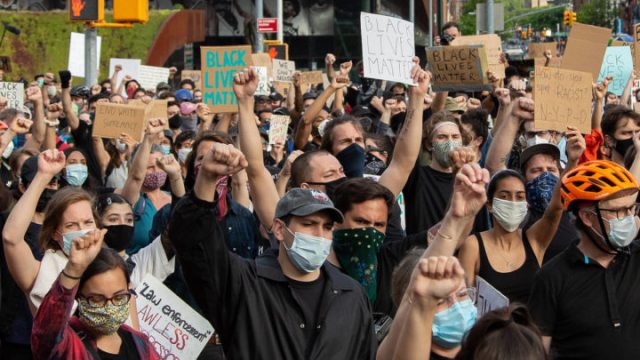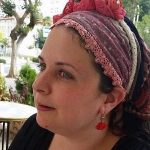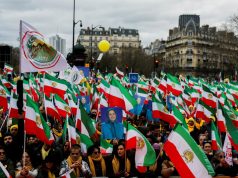By Rachel Avraham
I just returned from a visit to Portland, Oregon, the capital city of Antifa in the United States and I was absolutely shocked about how apathetic people are about the State of Israel. I went to the Farmer’s Market there and asked ten people, “What do you think about Israel?” Two out of the ten had solid opinions, one person had an opinion they did not wish to share and the rest of the people interviewed just had “no opinion.”
As for the one who had an opinion, the first one stated, “I think the whole country should be paved over and made into a parking lot.” In other words, this person is so anti-Semitic that he does not even wish to spare the birds, the trees, and the other wildlife in the State of Israel. Nor does he seem to be bothered that all of the great archeological treasures in the Holy Land would be destroyed. He thinks that the entire country should be demolished and that is it.
The second person stated, “I have an opinion, but not one I wish to share with an Israeli journalist.” And the third person stated, “I love the country and the falafel, but I hate Prime Minister Benjamin Netanyahu. However, a country is never judged by its leaders.” He noted that he visited Israel once to see an Israeli girlfriend. He was the only interviewee that identified as Jewish. Yet, even a Jewish person from Portland did not have a high opinion of Israel’s Prime Minister, so one can only imagine how the non-Jews felt.
In a separate visit, I went to the Jewish Museum in Portland, Oregon in order to get a flavor about what the local Jewish community feels. To my utter dismay, I saw an entire exhibit on Jewish activism, which proclaimed: “In Oregon, community activism is a way of life. We advocate for social and political change and push back against discrimination. We exercise our constitutional rights to freedom of express, public assembly and peaceful protest. We march for a wide array of causes: to end gun violence, to support education and women’s rights and to assert that Black Lives Matter.” Pro-Israel advocacy is not even included on the list. However, some causes that have anti-Semitic components, most certainly are.
According to the Jewish Public Affairs Council, “One subset of the movement, the Movement for Black Lives, opposes US military aid toward Israel. This is not the consensus position of the entire movement. The Black Lives Matter movement is diffuse and diverse. The majority of action and policy positions, on such issues as poverty, policing, healthcare, food security, and education are determined locally. But in 2016, it issued a charter that leveled ugly accusations against Israel.” Nevertheless, the Jewish Museum in Oregon described the Black Lives Matter Movement as a “Jewish cause” that the local Jewish community in Portland supports.
Another cause supported by the Portland Jewish Museum is the “Women’s March: An estimated 70,000 to 100,000 people flooded Portland’s waterfront for the worldwide Women’s March on Donald Trump’s first day as president, despite the soaking rain. Held in support of gender equality, civil rights and other issues, it was one of the largest public demonstrations in Oregon’s history. The gathering was held on a Saturday and included many members of Oregon’s Jewish community, some of whom walked more than six miles to uphold the sanctity of Shabbat.”
Interestingly, in 2019, CNN reported how three of the founding members of the Women’s March were anti-Semitic: “Tamika Mallory, Bob Bland, and Linda Sarsour will transition off of the board and focus on other advocacy projects. The group’s leadership has faced criticism for their association with the leader of the Nation of Islam, Louis Farrakhan. The Nation of Islam is a designated hate group by the Southern Poverty Law Center, and Farrakhan is known for hyperbolic hate speech aimed at the Jewish community.” Interestingly, the Women’s March did not kick these individuals out of the movement all together, even though their anti-Semitism is apparent to all. Yet, the Jewish Museum considers the Women’s March to be a “Jewish cause.”
Another cause supported by the Portland Jewish Community is Occupy Portland: “Occupy Portland began in downtown Portland on October 6, 2011 to protest worldwide economic inequality and corporate influence on democracy. It was inspired by the Occupy Wall Street movement that began in New York City a few weeks earlier. Members of Portland’s Jewish community in solidarity with the protesters constructed a sukkah in downtown Portland during the Sukkot holiday.”
Interestingly, the Occupy Wall Street Movement has also faced criticism for having some anti-Semitic protesters. As the New York Times reported in 2011, “Among the hodgepodge of signs that have sprouted in Zuccotti Park in Lower Manhattan, one man in jeans and a baseball cap has been carrying placards that shout their suggestions: ‘Google: Jewish Billionaires’ and ‘Google: Zionists control Wall St.’” Nevertheless, the Portland Jewish Museum endorsed the Occupy Movement as a “Jewish cause.”
Given the fact that the Oregon Jewish Museum endorsed the Black Lives Matter Movement, the Women’s March and Occupy Portland, it should not come as a surprise that they also placed a placard in solidarity with the Israeli left who is protesting against Israeli Prime Minister Benjamin Netanyahu’s judicial reforms right now: “Israeli society is known for its robust and colorful political discourse.”
They continued: “Israelis value the ability to be openly self-critical, which is often expressed in mass demonstrations. Many protests are directed towards government policies that allow building illegal settlements in the West Bank. The largest demonstrations in the history of Israel have been those protesting the attempts of Prime Minister Benjamin Netanyahu to disempower the Supreme Court, a judicial overhaul which would strike at the democratic core of the State of Israel.”
However, Israel is not the most important issue for the Portland Jewish community or the vast majority of people in Portland. According to the Portland Jewish Museum, the most important issues in Portland are climate change followed by mental health. In an interview, Rabbi Steven Moscowitz, a local Reform rabbi, proclaimed that although he lacks polling data, the most important issues to Portlanders appears to be homelessness, mental health issues, drug addiction, crime and neighborhood livability: “I think that the Jewish community shares those concerns.”
However, he did state that the Jewish community in Portland has dealt with anti-Semitism: “Within the last three years, there was an anti-Semitic incident when Congregation Beth Israel had damage, when a fire was set to the door.” In fact, the Jewish Museum in Portland even mentioned it in their Jewish Activism exhibit and noted the anti-Semitism that has risen across America as a Jewish cause, stressing that Jews across America need to fight against anti-Semitism together with Islamophobia, homophobia and racism. However, it is still not one of the main issues affecting Portlanders. As the rabbi stressed, “I personally have not faced anti-Semitism in Portland, but I did in Southern California.”
What the respectable rabbi faced in Southern California was troubling nevertheless. According to the rabbi, “There is a church based in Kansas that is homophobic. They came to Long Beach California and they were going to picket two places, one was the Jewish Community Center and one was my synagogue, Temple Israel. We were alerted that they were going to be coming and told to take a low profile. But I took the opposite approach. I said that we should counter their hate with love. They picketed our Saturday morning prayer. So, I invited other people of faith to attend our services as an expression of goodwill. Outside of our synagogue, neighbors of the synagogue poured out and surrounded the picketers and said they should go home, as they supported the presence of the synagogue in the neighborhood. They were a hate filled group. It was one of those moments that allowed us to connect us with another.”
Nevertheless, despite such incidents, your average Jew in Portland is more likely to rally against climate change rather than fight the anti-Semitism that is pervading American society. And when it comes to defending the State of Israel, the average Jew in Portland is not likely to lift a finger, and the “average Joe” on the street is completely apathetic, if not downright hostile.
Rachel Avraham is a political analyst working for the Safadi Center for International Diplomacy, Research, Public Relations and Human Rights, which is run by Mendi Safadi, a former Likud Candidate for the Knesset and a former chief of staff of former Israeli Communication Minister Ayoob Kara. Since 2012, she has been working as an Israel-based journalist and writer, for the Daily Wire, the Christian Post, the Baltimore Jewish Times, the Jerusalem Post, Israel Hayom, Ahval and many other publications across the globe. She received her MA in Middle Eastern Studies from Ben-Gurion University. She got her BA in Government and Politics with minors in Jewish Studies and Middle Eastern Studies from the University of Maryland at College






